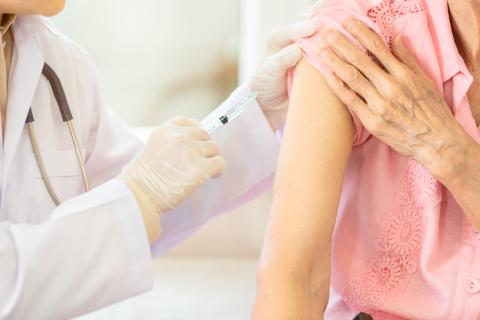
Data from the latest round of the REACT study has shown that the risk of infection with COVID-19 is around three times lower for people who have received a booster dose, compared to those who are double vaccinated.
Of more than 8,300 people studied who had been given a booster, just 30 became infected after two weeks, when immunity is expected to have been established.
In addition, the risk of infection was more than halved for school-age children who had a first dose. The risk was even lower (68%) for symptomatic infection.
Researchers analysed results from swab tests taken at home by more than 100,000 people in England between 19 October and 5 November. They found that 1.57% of people (1 in 64) were infected, down slightly from 1.72% in the time period ending a week earlier.
Infections were most common among school-aged children (5.21% for 13 to 17-year-olds, and 4.95% for 5 to 12-year-olds).
The highest numbers of infections were in the South West (1.97%), more than three times the number previously recorded in September.
Over 800 positive samples were further analysed to read the viral genetic code. All of them were found to be the Delta variant, with around 12% being the AY.4.2 sub-lineage, currently defined as a ‘variant under investigation’. People infected with this form of the virus were less likely to experience the ‘classic’ symptoms of COVID-19 (loss or change of sense of taste or smell, fever, new persistent cough).
Other key findings included:
- Infections were more than three times higher in households with children compared to those without
- The rate of breakthrough infections in people who have had two vaccine doses has doubled since July, likely in part due to waning of immunity.
- Prevalence had doubled since September in those aged 65 and above, almost all of whom were vaccinated.
The REACT programme is commissioned by the Department of Health and Social Care and is led by researchers at Imperial College London together with Ipsos MORI. Data are continually reported to the Government to inform decision-making. The latest findings are available here as a preprint, meaning they have not yet gone through the peer review process.
Professor Paul Elliott, director of the REACT programme at Imperial’s School of Public Health, said:
Although hospitalisations and deaths remain lower than previous peaks, the data show that infections across the country remain very high. The rate of prevalence has steadily declined throughout this round, but an overall figure of 1.57 per cent is still nearly two-fold higher than that recorded in the previous round.
It is possible that the prevalence rate could rise once again now that children have returned to school following half-term, though this could be at least partially offset by as many people as possible having booster jabs when offered and those aged twelve years or over having the vaccine.
Dr Jenny Harries, Chief Executive of the UK Health Security Agency, said:
This round of REACT provides another reminder of the effectiveness of the vaccines against COVID-19. As we approach winter, it is vital that everyone eligible comes forward for their jabs – whether that’s their first dose, second or a booster.
Remember that anyone over 12 years old is now able to receive their first jab, and boosters will soon be offered to everyone over 40. Please do take up that offer to ensure your immunity does not wane.
